Diversity
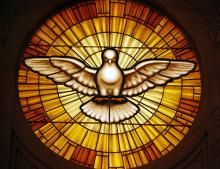
All were amazed and perplexed, saying to one another, ‘What does this mean?’
Acts 2.12 (NRSV)
Charles Ramsey, the African American male dishwasher who rescued Amanda Berry from captivity preached a transforming sermon when he shared his story about how he helped a Euro American woman in distress escape from 10-years of captivity. Ramsey boldly told the local television news reporter in Cleveland, “Bro, I knew something was wrong when a little pretty white girl ran into a black man’s arms.” And later when CNN’s Anderson Cooper asked Ramsey, how he felt about being a hero, Ramsey said, “No, no, no. Bro, I’m a Christian, an American. I am just like you. We bleed the same blood …”
Ramsey’s blunt honesty which spoke to the existence of racism and his sincere compassion for humanity was a 21st century mystification; a “radical real lived” theological symbol for the reason, why Christians celebrate Pentecost – the birth of the Holy Spirit and the historic beginning of the Christian Church. Biblical scholars teach us on the Day of Pentecost that a strong wind swept through a house where Jesus’ followers gathered days after he was resurrected from the dead. It was in the city of Jerusalem, where Jewish pilgrims gathered to celebrate Shavuot and people from other cultures who spoke diverse languages — believers and non believers of Jesus, heard about God’s powerful works in their native tongues and felt God’s holy presence.
When the day of Pentecost came, they were all together in one place. And suddenly from heaven there came a sound like the rush of a violent wind, and it filled the entire house where they were sitting. Divided tongues, as of fire, appeared among them, and a tongue rested on each of them. All of them were filled with the Holy Spirit and began to speak in other languages, as the Sprit gave them ability.
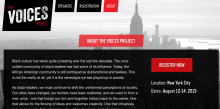
There is a question that is usually on the hearts and minds of many if not most people who are living and working in missions or active for justice when they attend events. There is an elephant in the room, a funny feeling in our stomach. The question is, where are the people of color?
"Leroy, where are the black people?"
My heart always sinks, as I know my friends who lead these events want nothing more than to see more diversity. I have had many conversations and even disagreements about what the answers may be to how to "diversify.” A few years ago I went to New York to visit my friend Gabe Lyons who I have known for quite a few years now. I went to Gabe because he is a friend, but also because he’s a person with experience in gathering people together. I had this desire in my heart to bring people of color together, specifically black folks. Gabe and I talked for an afternoon and I left there believing perhaps it was time for me to gather black leaders together.

When Oklahoma voters overwhelmingly approved a 2010 ballot measure that prohibits state courts from considering Islamic law, or Shariah, the Council of American-Islamic Relations filed a lawsuit within two days challenging the constitutionality of the measure, and won.
But when Oklahoma Gov. Mary Fallin signed a similar measure, one that its sponsor said would forbid Shariah, on April 19 of this year, no legal challenges were mounted.
Why the change?
The biggest difference is that the older bill — and others like it — singled out Islam and Shariah, but also raised concerns that they could affect Catholic canon law or Jewish law. Many early anti-Shariah bills also made references to international or foreign law, which worried businesses that the new bills would undermine contracts and trade with foreign companies.
The new bills, however, are more vague and mention only foreign laws, with no references to Shariah or Islam. They also make specific exceptions for international trade. All of that makes them harder to challenge as a violation of religious freedom.
“These bills don’t have any real-world effect. Their only purpose is to allow people to vilify Islam,” said Corey Saylor, CAIR’s legislative affairs director, of the more recent bills.

THE TERM “DIVERSITY” in professional and educational circles in the United States is frequently mentioned as positive on its face, needing no justification. “Diversity is our strength” or “diversity enriches us” are common statements.
But Harvard professor of comparative religion Diana Eck points out that diversity is simply a demographic fact—a situation in which people with different identities live in close quarters. The term says nothing about how those people get along with one another. Frankly, if all we knew about religious diversity in particular were the stories carried on the international news, it would be hard to conclude anything except that the close gathering of Muslims, Christians, Jews, Buddhists, Hindus, and others is nothing but a recipe for conflict.
Religious conflict is especially deadly because the participants believe they are fighting for cosmic reasons—where death may be welcomed as martyrdom—and religious communities are the largest repositories of social capital in many civil societies, providing endless amounts of energy, people, and resources to mobilize.
But what if the social capital among religious communities could be bridged and people who orient around religion differently could be convinced to cooperate with one another? What if the cosmic narratives of religious traditions viewed people of other faiths as partners in the quest for the kingdom on earth? This is the hope of the interfaith movement, and building this movement is the job of interfaith leaders.
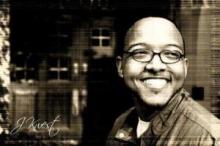
For nearly a decade, the ministry of Julian “J.Kwest” DeShazier has been an exploration in the relationship between music and faith. As artist, this Chicago native has used his unique rhythm to tell stories of deep meaning, inside and out of the church. A 2007 Holy Hip Hop Award winner, his song, “So Blessed,” was featured on the Grammy-nominated compilation Holy Hip Hop: Taking the Gospel to the Streets, and J has been celebrated as “Living Black History” by Urban Ministries International.
In 2012 he and his group, Verbal Kwest, were featured in the Sojourners, OXFAM, and Bread for the World-produced documentary The Line, providing a critical voice against poverty and violence in the U.S. A graduate of Morehouse College and the University of Chicago Divinity School, Julian currently serves as senior pastor of University Church in Chicago, and is a regular contributor to Sojourners, UrbanFaith and Kidult publications.
Editor's Note: There may be some objectional language in the beginning part of this about hour-long interview.

BIRMINGHAM, Ala. — In May 1963, thousands of Birmingham school children faced police dogs, fire hoses, and possible arrest to demonstrate against segregation. Now, 50 years later, those who were part of what became known as the “Children’s March” say they don’t want their story to be forgotten.
“We were doing this not just for ourselves but for some higher purpose,” said one of the young marchers, Freeman Hrabowski III. “It focused on civil rights for all Americans.”
Hrabowski is now president of the University of Maryland, Baltimore County. He was 12 when he marched in Birmingham and was arrested for parading without a permit. He and hundreds of other children were held in custody for five days before being released.
Experts say the children’s crusade helped galvanize the civil rights struggle at a time when efforts were flagging.
“That was really the tipping point in a tipping year,” Pulitzer Prize-winning author Taylor Branch, who has written a series of books about the civil rights movement, told the PBS program “Religion & Ethics NewsWeekly.”
Watch Birmingham and the Children’s March on PBS. See more from Religion & Ethics NewsWeekly.
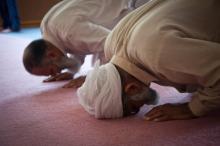
Muslims in America are much less inclined to support suicide bombing than other Muslims abroad, and are more likely to believe that people of other faiths can attain eternal life in heaven, according to a new report released Tuesday by the Pew Forum on Religion & Public Life.
“The World’s Muslims” report looks at Muslim views across seven categories: Islamic law; religion and politics; morality; women; relations among Muslims; interfaith relations; and religion, science, and pop culture. There is also a special section on U.S. Muslims.
Of the countries surveyed, only a majority of Muslims in America — 56 percent — believe people of other faiths can go to heaven; by contrast, that figure among U.S. Christians is about 64 percent. U.S. Muslims are also less likely than Muslims abroad to believe in evolution, sharing views that are closer to those of U.S. Christians.
On suicide bombing, 81 percent of U.S. Muslims said it was never justified, 7 percent said it was justified to “defend Islam,” and 1 percent said it was “sometimes justified.”

WASHINGTON — The adult survivors of the Holocaust are mostly gone now, and those who survived as children — and were old enough at the time to remember their ordeals — are now in their 70s and 80s.
It won’t be long before no eyewitnesses remain.
That’s why, as the U.S. Holocaust Memorial Museum marks its 20th anniversary today (April 29) with more than 750 survivors, museum officials are calling it one the last large gatherings of those who managed to escape Hitler’s death machine.
For those who have dedicated themselves to teaching future generations about the Holocaust and its victims, the demise of the survivors means looking backward in a different way — a way that no longer includes people looking others straight in the face and recounting what they saw and what they lived.

I’ve experienced some strange extremes lately. First, I attended – and spoke at – the Subverting the Norm conference in Springfield, Mo., where we took some time to consider how, if at all, so-called “radical theology” could exist within today’s religious systems. Then I got home and found my latest TIME Magazine, with a cover story titled “The Latino Reformation,” which reveals what most within Protestantism have known for some time: formerly Catholic Latino Christians are dramatically reshaping the face of the American Christian landscape.
Interestingly, there is little-to-no overlap between these two groups – a point which was made clear to me by the fact that there were very few people of color in attendance at Subverting the Norm. One comment, from an African-American woman who was there, was that the very focus of the conference (on academic, esoteric questions of theology and philosophy) assumed the kind of privilege still dominated by middle-class white males. Put another way: while we’re busy navel-gazing and discussing the meaning of Nietzsche’s “death of God,” non-Anglo religious leaders were busy dealing with real-world problems right in front of them.
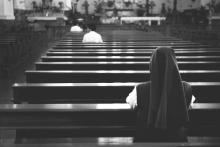
On March 31, 1968, a few short days before his assassination, Dr. Martin Luther King, Jr., preached at the National Cathedral in Washington, D.C.
He spoke a phrase he had used on a number of occasions and which by now, 45 years later, has gained a hard proverbial ring: "Eleven o'clock on Sunday morning is the most segregated hour of America."
The situation he described has stubbornly resisted any real movement, but the recent emergence of a radical theology dealing with violence itself is promising a crack in the walls that divide.
Black theologians such as James Cone and Kelly Brown Douglas have recognized the work of the theoretical anthropologist, René Girard. They consider it one of the few frameworks able to illuminate the nature of the violence suffered by the African-American community.
American Muslim leaders said they stand against terrorism committed in the name of Islam, trying to distance themselves from the suspects in the Boston Marathon bombings who were identified as Muslims with ties to Chechnya.
“We will never allow ourselves to be hijacked by this attempt, and we will not allow the perception to be that there is any religion in the world that condones the taking of innocent life,” said Nihad Awad, national executive director of the Council on American-Islamic Relations.
As the manhunt intensified in and around Boston, Muslim leaders convened a press conference Friday to denounce the attacks and to urge the media not to link their faith with violent extremism.
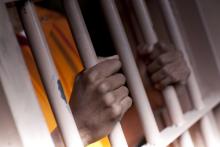
The United States has the highest incarceration rate in the world; one third of those incarcerated are serving long-term sentences for petty, non-violent crimes. One out of three African-American men will serve some sort of time under present law enforcement practices and the current criminal justice system. In Washington, D.C., that number jumps to an estimated three out of four. The United States imprisons a larger percentage of its black population than South Africa did at the height of apartheid.
More than 50 people gathered at Emmanuel Church of God in Christ in southeast Washington, D.C., on Sunday afternoon to hear the Rev. Louis Hutchinson remind them of these facts. Rev. Donnell Smith called the trend: “legalized discrimination.”
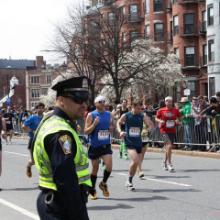
No sooner had the reality of the Boston Marathon bombing sunk in on Monday afternoon than Muslim activists in the U.S. began sending out a slew of news releases, tweets, and Facebook messages urging prayers and aid for the victims — and condemning whoever was behind the horrific attack.
“American Muslims, like Americans of all backgrounds, condemn in the strongest possible terms today’s cowardly bomb attack on participants and spectators of the Boston Marathon,” Nihad Awad, executive director of the Council on American-Islamic Relations said in a statement on Monday.
It’s a familiar race against time for Muslim groups. Almost as soon as the smoke cleared around Copley Square, they knew from long experience that some would immediately point the finger of blame in their direction.
Many widely believed Muslims were behind the 1995 Oklahoma City bombing, until American militiaman Timothy McVeigh was convicted of the crime.
“We also call for the swift apprehension and punishment of the perpetrators,” Awad added, echoing a statement from the Muslim Public Affairs Council that called on “all of us as Americans to work together to bring those responsible to justice.”
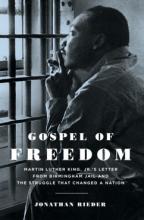
Fifty years after the Rev. Martin Luther King Jr. challenged white church leaders to confront racism, an ecumenical network has responded to his “Letter from Birmingham Jail.”
“We proclaim that, while our context today is different, the call is the same as in 1963 — for followers of Christ to stand together, to work together, and to struggle together for justice,” declared Christian Churches Together in the USA in a 20-page document.
The statement, which is linked to an April 14-15 ecumenical gathering in Birmingham, Ala., includes confessions from church bodies about their silence and slow pace in addressing racial injustice.
“The church must lead rather than follow in the march toward justice,” it says.

Unmarried couples who live together are staying together longer than in the past — and more of them are having children, according to new federal data that details just how cohabitation is transforming families across the U.S.
For almost half of women ages 15-44, their “first union” was cohabitation rather than marriage, says the report from the National Center for Health Statistics. For less than one-quarter, the first union was marriage. The report was based on in-person interviews conducted between 2006 and 2010 with 12,279 women ages 15-44.
“Instead of marriage, people are moving into cohabitation as a first union,” said demographer Casey Copen, the report’s lead author. “It’s kind of a ubiquitous phenomenon now.”
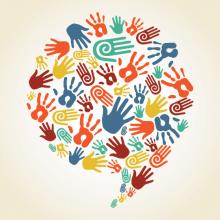
Whenever I hear the term Common Good I think of Thomas Paine’s infamous pamphlet Common Sense,which challenged the British government and the royal monarchy, but did not challenge the institution of slavery. As an African-American woman I enter the Common Good conversation cautiously because I know that in our society we have a habit of taking what is good for Western hegemony and making it the standard for everyone else.
As we pursue the Common Good, let us remember what was once considered common and good during earlier points in American history: chattel slavery, indigenous genocide, and institutionalized sexism. To truly come to a Common Good, we need to honor a diversity of voices and challenge our assumptions about what is common and what is good. Our default is to take what is good for our culture, gender, or community and make it the common standard for all. I have experienced being invited into organizations that were aiming to do good in the world, but an expectation existed that I would be silent about my unique concerns as an African woman. I know that denying my reality can never be good for my spiritual, physical, or social well being.

Lego is defending its “Star Wars”-based Jabba the Hutt toy set after a Turkish cultural group said it promulgates negative stereotypes of Muslims.
Earlier this year, the Turkish Cultural Community of Austria criticized the Danish toy company, saying the Jabba’s Palace set was insensitive because of its similarity to Muslim mosques.
“The terrorist Jabba the Hutt likes to smoke a hookah and have his victims killed,” said the statement, reported by the Austrian Times. “It is clear that the ugly figure of Jabba and the whole scene smacks of racial prejudice and vulgar insinuations against Asians and Orientals as people with deceitful and criminal personalities.” Earlier this year, the Turkish Cultural Community of Austria criticized the Danish toy company, saying the Jabba’s Palace set was insensitive because of its similarity to Muslim mosques.
This past weekend I attended the memorial for a very dear friend and amazing individual, Richard Twiss. Richard, who was a descendent of the Sioux and Lakota tribes of South Dakota, was a scholar, writer, speaker and thought leader. Richard was also a follower of Jesus.
Richard was both one of the most personable and charismatic individuals I’ve ever met. He had a way about him. I’ve never known someone so authentic and full of love as to make everyone he spent time with feel unique, special and valuable. Richard was also one of the sharpest prophetic voices I’ve ever heard. He was unyielding with logic and his respect for truth. He was hard as nails when it came to excuses from others who would try to compromise truth. Truth, for Richard, was unwavering.
If I was able to ask Richard today how best to honor him, I know that — after talking about his concern for his wife, kids, and grandkids — he would expect me to use my voice to speak truth.

WHEN POPE BENEDICT XVI unexpectedly announced his resignation in mid-February, many expressed admiration for the decision's honesty and humility, and much speculation followed about the reasons for it—and the consequences it would have.
As transition takes shape in the Vatican, Catholics around the world are commemorating the 50th anniversary of the Second Vatican Council, which took place from 1962 to 1965 and which redefined the church's relationship to the world. Vatican II's final document said: "This council can provide no more eloquent proof of its solidarity with, as well as its respect and love for the entire human family with which it is bound up, than by engaging with it in conversation about these various problems," referring in part to the "profound and rapid changes ... spreading by degrees around the whole world." Half a century ago, few could have predicted the dramatic changes that were to follow in science, technology, global integration, and social mores.
Catholics know that in the last 50 years the institutional church has been at the forefront of calls for a more just, compassionate, and sustainable world. Catholic social and ecological teaching is well developed and clearly articulated. The church has offered analysis and challenging proposals for financial reform, arms control, care for creation, and multilateral political structures of accountability in response to globalization.
We want the new pope to continue, deepen, and make much more visible—including to Catholics around the world—the church's prophetic work for social and economic justice, for environmental sustainability, and for wise, just, and inclusive peace. We want the new pope to engage the Islamic world, respectfully cooperating in response to orchestrated fear, enemy-making, and all forms of religious extremism. We want him to promote cultures of peace in a world that is increasingly violent. We want him to be open to new cosmological insights that are transforming human consciousness; shifting our understanding of earth community and of our planet's place in the vast, expanding universe; and maturing our reflections on the One who is Creator, Incarnation, and Spirit of love.
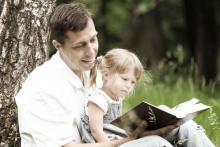
I wonder if God reads the Bible. I mean, what we’re trying to do when we read the text is to understand it the way God understands it, right? I grew up in fundamentalist churches where biblical authority derived from the belief that God wrote it. I remember writing a paper at my Baptist college in which I said God “inspired” the authors to write what they had written; my Bible professor corrected me, saying God had inspired the text itself. I know he was just trying to fortify in me the doctrine of inerrancy. In this view, authority lies in God’s breathing of the Word, in what God meant when he wrote it. God speaks; we try to understand.
But what if God reads the Bible? And what if, as feminist Bible scholar Claudia Camp argues, scriptural authority “is always understood in relation to the authority of persons?" (p. 61) In one sense, this conclusion is inescapable. Paul’s second letter to Timothy may give us intra-biblical proof of the Bible’s own “inspiration,” but that’s a kind of circular reasoning, isn’t it? The Bible did not decide for itself what it was. By the time I wrote that college paper, Rodney Clapp’s book A Peculiar People had already opened my eyes to the very human process that gave us the Bible. It did not drop out of the sky like spittle from the mouth of God; the church drew water from the rivers of wisdom, put it in the containers of the old and new testaments, law, prophets, and Gospel, and discarded what the church deemed unnecessary. It was a messy, political process like any collective endeavor.